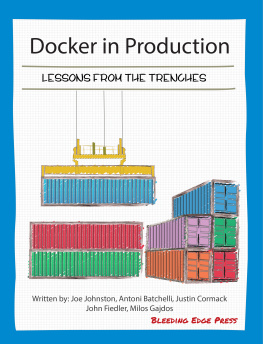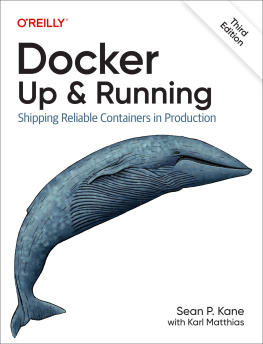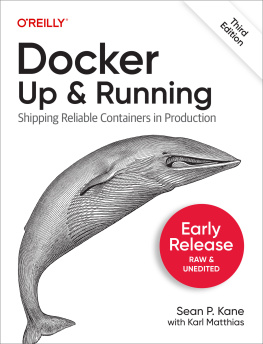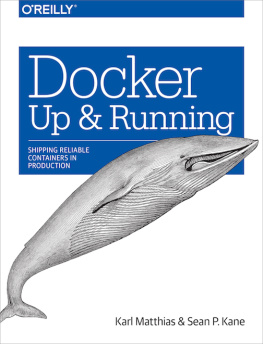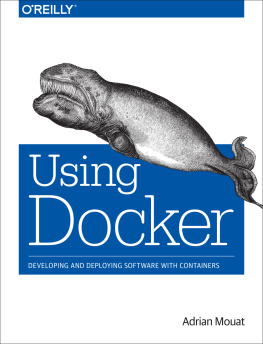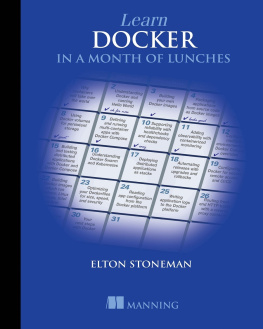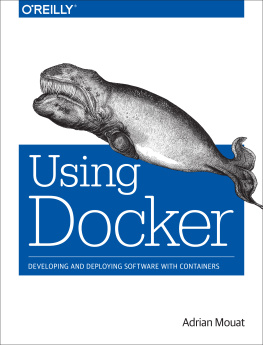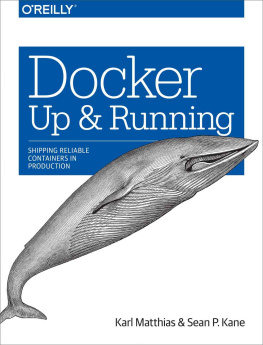Or more poignantly, how do you navigate the hype to successfully address real world production issues with Docker? This book sets out to answer these questions through a mix of interviews, end-to-end production examples from real companies, and referable topic chapters from leading DevOps experts. Although this book contains useful examples, it is not a copy-and-paste how-to reference. Rather, it focuses on the practical theories and experience necessary to evaluate, derisk and operate bleeding-edge technology in production environments.
As authors, we hope the knowledge contained in this book will outlive the code snippets by providing a solid decision tree for teams evaluating how and when to adopt Docker related technologies into their DevOps stacks.
Running Docker in production gives companies several new options to run and manage server-side software. There are many readily available use cases on how to use Docker, but few companies have publicly shared their full-stack production experiences. This book is a compilation of several examples of how the authors run Docker in production as well as a select group of companies kind enough to contribute their experience.
Why Docker?
The underlying container technology used by Docker has been around for many years, even before dotCloud, the Platform-as-a-Service startup, pivoted to become Docker as we now know it. Before dotCloud, many notable companies like Heroku and Iron.io were running large scale container clusters in production for added performance benefits over virtual machines. Running software in containers instead of virtual machines gave these companies the ability to spin up and down instances in seconds instead of minutes, as well as run more instances on fewer machines.
So why did Docker take off if the technology wasnt new? Mainly, ease of use. Docker created a unified way to package, run, and maintain containers from convenient CLI and HTTP API tools. This simplification lowered the barrier to entry to the point where it became feasible--and fun--to package applications and their runtime environments into self-contained images rather than into configuration management and deployment systems like Chef, Puppet, and Capistrano.
Fundamentally, Docker changed the interface between developer and DevOps teams by providing a unified means of packaging the application and runtime environment into one simple Dockerfile. This radically simplified the communication requirements and boundary of responsibilities between devs and DevOps.
Before Docker, epic battles raged within companies between devs and ops. Devs wanted to move fast, integrate the latest software and dependencies, and deploy continuously. Ops were on call and needed to ensure things remained stable. They were the gatekeepers of what ran in production. If ops was not comfortable with a new dependency or requirement, they often ended up in the obstinate position of restricting developers to older software to ensure bad code didnt take down an entire server.
In one fell swoop, Docker changed the roll of DevOps from a mostly say no to a yes, if it runs in Docker position where bad code only crashes the container, leaving other services unaffected on the same server. In this paradigm, DevOps are effectively responsible for providing a PaaS to developers, and developers are responsible for making sure their code runs as expected. Many teams are now adding developers to PagerDuty to monitor their own code in production, leaving DevOps and ops to focus on platform uptime and security.
Development vs. Production
For most teams, the adoption of Docker is being driven by developers wanting faster iterations and release cycles. This is great for development, but for production, running multiple Docker containers per host can pose security challenges, which we cover in chapter 10 on Security. In fact, almost all conversations about running Docker in production are dominated by two concerns that separate development environments from production: 1) orchestration and 2) security.
Some teams try to mirror development and production environments as much as possible. This approach is ideal but often not practical due to the amount of custom tooling required or the complexity of simulating cloud services (like AWS) in development.
To simplify the scope of this book, we cover use cases for deploying code but leave the exercise of determining the best development setup to the reader. As a general rule, always try to keep production and development environments as similar as possible and use a continuous integration / continuous deliver (CI/CD) system for best results.
What We Mean by Production
Production means different things to different teams. In this book, we refer to production as the environment that runs code for real customers. This is in contrast to development, staging, and testing environments where downtime is not noticed by customers.

